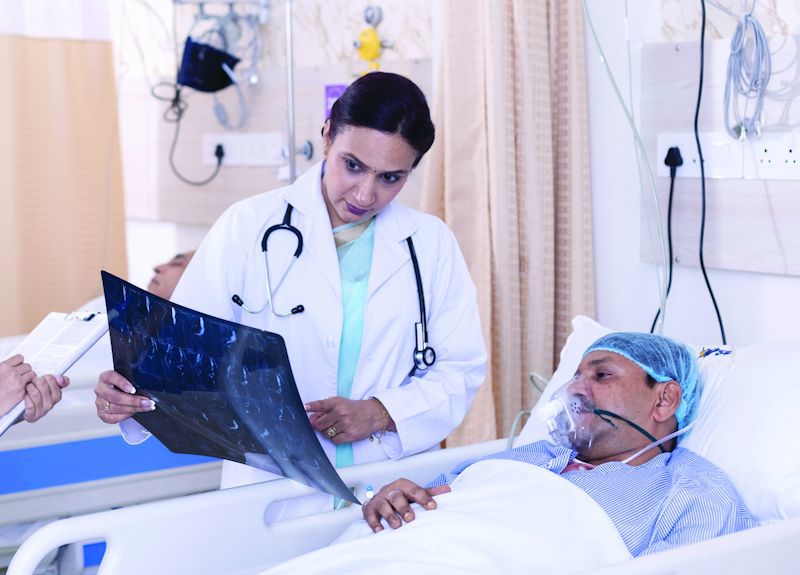
Rakesh Kapoor
Cancer remains one of the most significant health challenges accounting for approximately one in six deaths globally. It is characterised by the uncontrolled growth and spread of abnormal cells in the body. These abnormalities arise from mutations in the DNA within cells, which can be inherited or acquired due to exposure to carcinogens, environmental factors, lifestyle choices and genetic predispositions.
In recent years, certain cancers are rising globally, including liver, pancreatic, skin and certain head and neck cancers. Factors such as hepatitis B and C infections, UV radiation exposure, human papillomavirus (HPV) infection and lifestyle habits have been implicated in these rising trends. At least 90 to 95 per cent of all cancer cases have their roots in the environment and lifestyle factors, while only 5 to 10 per cent cancer cases are genetic. In many cases of head and neck, oesophagus and hepato-biliary (liver diseases and biliary) cancers, no clear-cut genetic correlation can be detected.
While genetic factors alone may not always determine cancer risk, they contribute to susceptibility and can influence tumour initiation, growth, and response to treatment. Certain cancers are more genetically dependent than others. These include breast, ovary, lung, prostate, colorectal, retina/eye cancer in children, stomach and prostate cancer and brain tumours.
According to data released by the WHO, 30-35 per cent cancer deaths are linked to diet, 25-30 per cent are due to tobacco use, while 15-20 per cent are because of infection. The rest are due to genetic factors.
Unhealthy diet, including processed or junk food, has emerged as a major factor in cancer growth. Certain substances found in foods are believed to have carcinogenic and tumour-promoting properties that lead to DNA damage and chromosomal changes. Nitrates present in cured and smoked foods are associated with an increased risk of stomach and oesophagus cancer. A diet high in fat has been linked to development of uterine, lung, prostate and colon cancer.
Excessive caloric intake has been implicated in gallbladder and endometrial cancers. Smoking tobacco (cigarettes, cigar, pipes) or using smokeless tobacco (chewing tobacco, snuff) is a significant risk for lung, throat, mouth, oesophagus, bladder and many other cancers. Lack of physical activity is associated with a heightened risk of breast, colon and prostate cancers. Regular and excessive alcohol consumption can raise the risk of developing liver, breast, oesophagus and mouth cancers.
As nearly 30 to 35 per cent cancer deaths are linked to unhealthy eating habits, a well-balanced diet that includes a wide variety of nutrient-rich foods, fruits, vegetables, lean proteins, whole grains, millets, and healthy fats can contribute to reducing the risk of cancer and aid in early detoxification of carcinogens. Even in cancer patients, proper nutrition can lead to fewer complications and better tolerance of cancer treatment.
As lifestyle habits and environmental factors raise the risk of certain type of cancers, awareness about cancer symptoms that may be similar to other ailments is necessary.
Significant and unexplained weight loss could be a symptom of pancreatic, stomach, oesophageal, or lung cancers.
New lumps or swellings in the breasts, testicles, lymph nodes, or other soft tissues could indicate cancerous growth.
Change in the size, shape, colour, or texture of moles or skin lesions could indicate skin cancer.
Constant fatigue or weakness that doesn’t improve with rest could be a symptom of leukaemia, colon cancer or cancers that cause blood loss or interfere with nutrient absorption.
Evaluate chronic pain that persists and doesn’t have an obvious cause.
Any change in bowel and bladder habits could be symptoms of colorectal or other gastrointestinal cancers. Also, frequent urination, blood in the urine, or painful urination may indicate bladder or prostate cancer.
Persistent cough, hoarseness, wheezing, or coughing up blood may be signs of lung cancer, throat cancer, or other respiratory tract cancers.
Difficulty in swallowing, persistent indigestion, or discomfort after eating could be symptoms of oesophageal or gastrointestinal cancers.
Change in the size, shape, or appearance of breasts, along with nipple discharge, could indicate breast cancer.
Irregular menstrual cycles, bleeding between periods, or postmenopausal bleeding may be signs of cervical, ovarian or endometrial cancers.
Addressing the interplay of various factors is crucial for cancer prevention, early detection and treatment. Continued research, public health initiatives and advancements in medicine are essential for reducing the global burden of cancer.
Vaccines that prevent
Vaccination is a powerful tool in cancer prevention. HPV (human papillomavirus) vaccination can prevent cervical, anal and oropharyngeal cancers, among others. HBV (hepatitis B virus) vaccination prevents hepatitis B virus infection, a major risk factor for liver cancer.
— The writer is Professor and Head-2, Department of Radiotherapy, PGIMER, Chandigarh
Join Whatsapp Channel of The Tribune for latest updates.



























